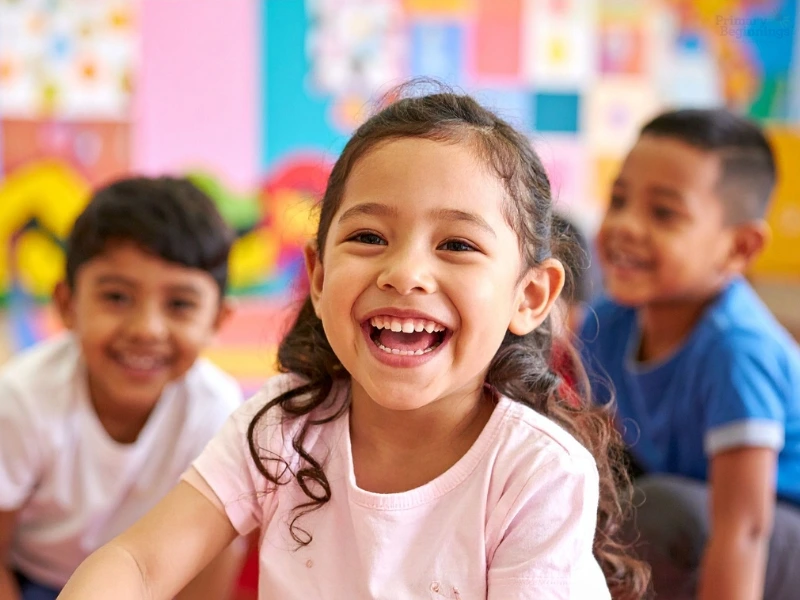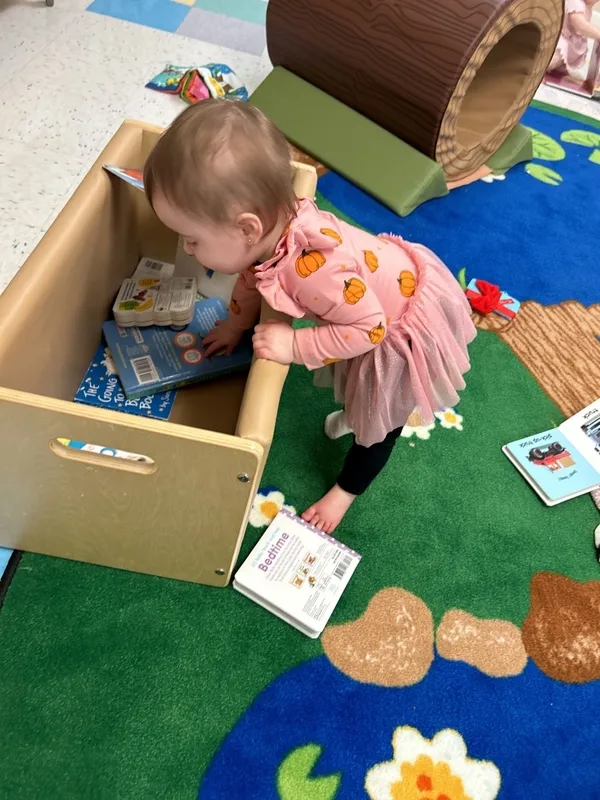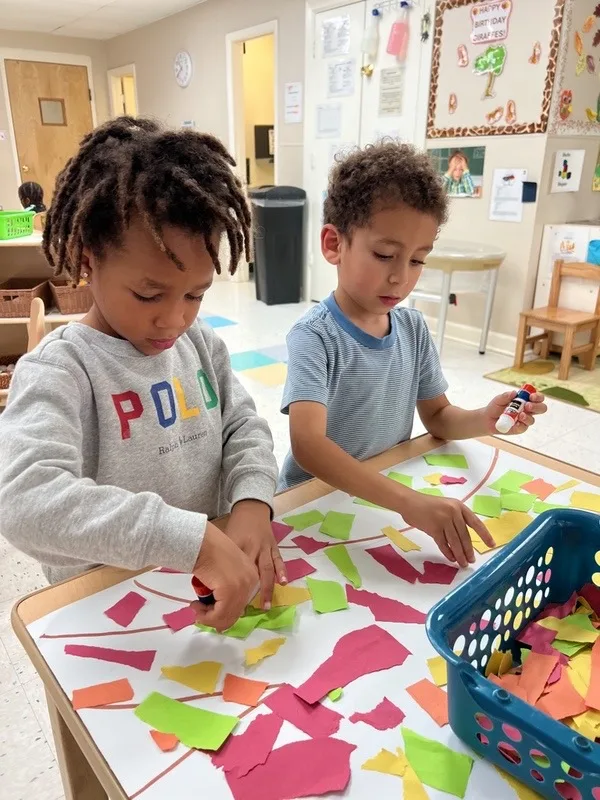Primary Beginnings Child Development Centerss in Raleigh are having an Open House for Prospective New…
When comparing daycare vs preschool programs, parents often wonder whether the two are the same. While both provide nurturing environments for children, their goals, structure, and learning outcomes differ. Knowing the distinctions between childcare services and nursery school programs helps families choose the right path for their child’s age group, schedule, and developmental needs.

Join the 5-star early childhood education providers from Primary Beginnings in Raleigh as we explore daycare vs preschool, the key differences and that set a child care program apart from a preschool program, and how to decide which option best fits your child and family.
Table of Contents
The Purpose of Day Care Programs
Child care programs serve as nurturing, structured environments where children can thrive while parents work or manage daily responsibilities. Programs focused on toddler care provide a safe space for social development through consistent routines and age-appropriate activities. When comparing daycare vs preschool, the purpose of daycare programs is to provide a safe, nurturing environment that supports children’s daily care and early social development.
Safe and Supportive Environment
Safety is the foundation of every quality daycare program. Facilities are designed to meet licensing standards, with secure check-ins, childproofed spaces, and trained caregivers who monitor children closely.
Consistent Routines and Stability
Child care centers operate on predictable schedules that help children feel secure. Regular nap times, meals, and play sessions establish a rhythm that builds comfort and confidence.
Socialization and Relationship Building
Kids who attend daycare experience daily interactions with peers. This teaches children how to share, cooperate, and communicate effectively while building emotional intelligence and empathy.
Early Learning Through Play
While the primary purpose of daycare is to provide a nurturing environment for the child, most programs include enriching activities that support learning through play. Children explore colors, shapes, music, and movement in ways that build foundational cognitive and motor skills.
Communication and Language Development
Everyday interactions with caregivers and peers expand vocabulary and listening skills. Singing songs, storytelling, and conversation help children understand tone, expression, and new words. This natural language development lays the groundwork for strong communication abilities.
Support for Working Families
Daycare programs make it possible for parents to maintain work schedules without sacrificing their child’s well-being. Flexible hours, dependable care, and open communication help families balance responsibilities. A reliable daycare partnership reduces stress and supports both parents and children throughout the week.
The Purpose of Preschool Programs
When exploring daycare vs preschool, the purpose of preschool programs is to focus on early learning and development through structured activities that build essential skills in young children.
Preschool programs focus on early childhood education—helping younger children (typically ages 3–5) develop cognitive, emotional, and social skills through structured activities and play-based learning.
The Role of Preschool Teachers vs Daycare Staff
When comparing daycare vs preschool and determining which is the best choice for your family, its important to consider the team of adults who will be responsible for your child's well being throughout the day. Both daycare and preschool staff share the same goal—supporting children’s growth and safety—however, their training, responsibilities, and teaching methods differ based on the program’s focus.
Daycare Staff Provides a Nurturing and Supportive Foundation
Daycare staff play a vital role in child care centers, especially for toddlers and infants who need consistent care, safety, and affection throughout the day.
The role of a child care provider is centered on creating a nurturing environment that encourages social skills, emotional comfort, and independence. They may help children with potty training, meals, naps, and developing healthy daily routines—all while promoting gentle exposure to learning concepts through storytelling, songs, and crafts.

Key qualities of daycare staff include:
- Providing reliable, high-quality child care for working parents
- Patience and attentiveness to meet each child’s emotional needs
- Emphasis on free play and age-appropriate exploration
- Building trust and comfort for children of a wider age range
Preschool Teachers Guide Early Learning and Development
Preschool teachers are early childhood education professionals who create structured learning experiences designed to build pre-academic skills and social confidence. They often hold degrees or certifications in early childhood education and are trained to lead activities that promote cognitive development, emotional growth, and social interaction.
In a preschool setting, teachers follow a formal curriculum and use assessment tools to track each child’s progress in areas like communication, motor skills, and problem-solving. They guide children through structured activities, free play, and small group learning, helping them prepare for the expectations of elementary school.
Key qualities of preschool teachers include:
- Focus on preparing children for kindergarten and school readiness
- Knowledge of early childhood development and learning milestones
- Ability to foster individualized attention within a group setting
- Use of play-based learning to make education fun and engaging

Working Together for Early Childhood Success
At Primary Beginnings, our Raleigh preschool teachers and daycare staff adhere to child care regulations in North Carolina, and must meet professional standards that ensure the safety and well-being of every child. Our early learning programs blend the expertise of preschool teachers with the nurturing care of daycare staff—giving children the best of both worlds as they progress from infancy to school age.
When Is Your Child Ready for Preschool?
Preschool readiness depends on your child’s age and developmental milestones. Generally, children ages 3 to 5 are strong candidates for preschool if they can:
- Follow simple directions and routines
- Engage in group activities for short periods
- Express their needs verbally
- Be separated from parents during school hours
- Are fully potty trained
Preschool hours often mirror the school year and may include half-day or full-day programs designed to build social skills and school readiness.
FAQs About Daycare and Preschool
What is the difference between daycare and preschool?
The difference between daycare vs preschool lies in purpose and structure. Daycares focus on full-day care for a wider age range, while preschools focus on early education for 3–5-year-olds with a structured curriculum designed to prepare children for kindergarten.
Are preschool and daycare the same?
No. Preschool offers education-oriented programs with certified preschool teachers, while daycare provides nurturing care and flexible hours to accommodate working parents.
What are the disadvantages of daycare?
Some families find that daycare’s wider age range and flexible structure offer less individualized attention to their child’s development than preschool does. However, many modern daycare centers now blend learning activities with play-based care.
What is the best age to start preschool?
Most children start preschool between ages 3 and 4, once they are potty trained and comfortable with brief separations from parents.
Is daycare better than preschool for a 2.5-year-old?
When considering the choice between daycare vs preschool for a 2.5-year-old, daycare may be more suitable since it provides flexible, nurturing care for younger age groups. Preschool programs generally begin around age 3 when children are developmentally ready for structured activities with other kids their age.
How do child care centers and preschools support early childhood education?
Both environments play key roles in early childhood development—daycare emphasizes emotional security and social skills, while preschool focuses on pre-academic and cognitive development in a learning oriented setting to prepare children for entering elementary schools.
Experience a 5-Star Raleigh Preschool and Child Care Center
At Primary Beginnings, we offer high-quality child care and preschool programs with a set curriculum that nurture your child’s curiosity, confidence, and love for learning. Our 5-star centers provide a safe, educational environment where every child thrives—whether they’re starting their preschool journey or preparing for kindergarten.
Get started today by calling our Spring Forest Road location at 919-790-6888, Falls of Neuse Road location at 919-615-0752, North Hills Drive location at 919-785-0303, or fill out the form below to schedule a tour of one of our three North Raleigh locations.
